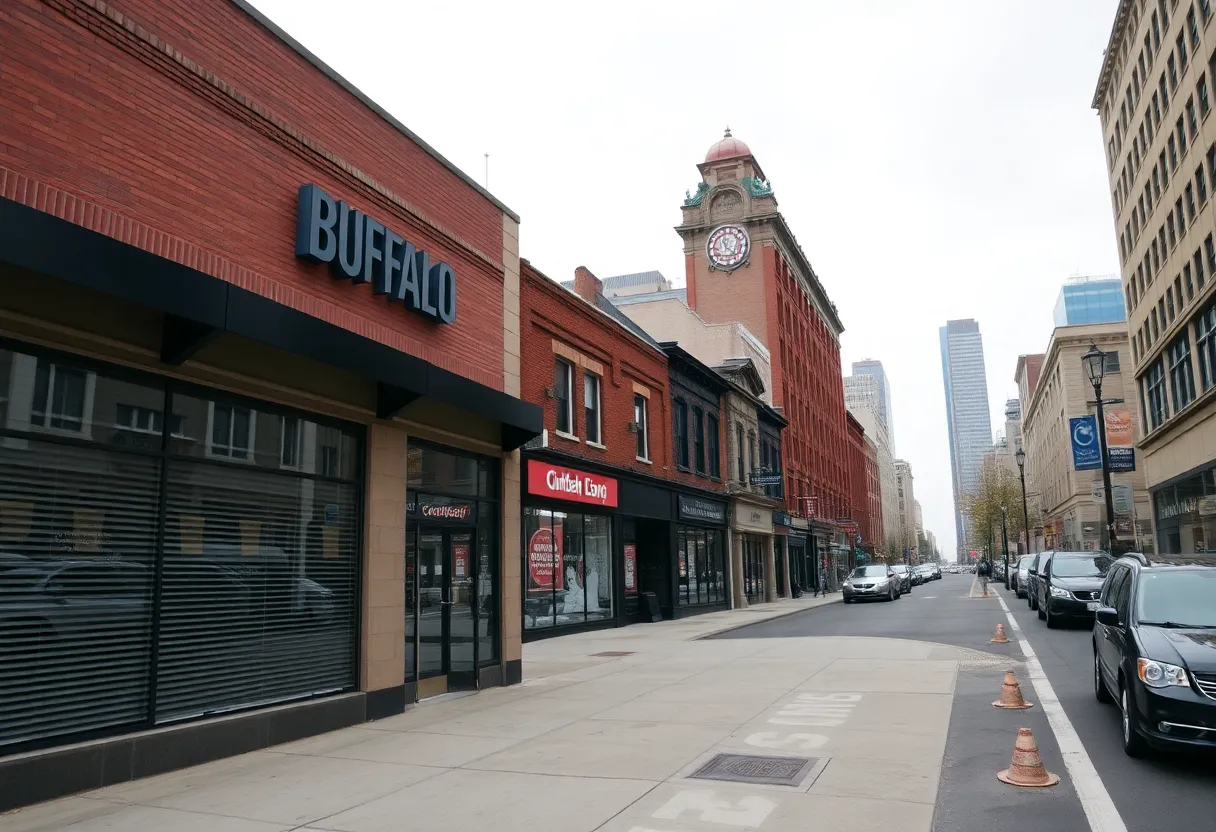Buffalo, NY, October 21, 2025
On October 21, 2025, a significant outage of Amazon Web Services (AWS) significantly impacted numerous businesses in Buffalo, NY. The disruption halted e-commerce operations and affected healthcare providers, leading to estimated financial losses in the millions. Local tech teams worked overnight to restore services, while the Chamber of Commerce announced a webinar to promote cybersecurity resilience among businesses. The incident highlights the vulnerabilities tied to cloud service dependence and has prompted discussions about infrastructural investments.
AWS Global Outage Hits Buffalo Businesses Hard
Buffalo, NY – October 21, 2025
A widespread Amazon Web Services (AWS) outage struck Buffalo on October 21, 2025, severely disrupting operations for numerous local businesses dependent on cloud infrastructure. The incident, which affected e-commerce platforms, healthcare providers, and other essential services, lasted over four hours and resulted in financial losses estimated in the millions. Local technology support teams acted swiftly, working overnight to minimize the fallout from the global disruption.
The outage began early in the day, halting access to critical cloud-based applications across Buffalo’s business sector. Companies unable to process online orders or access patient records faced immediate challenges, leading to frustrated customers and delayed shipments. While the exact trigger remains under investigation, AWS has issued a public apology and committed to infrastructure enhancements to prevent future occurrences.
In response to the chaos, Buffalo’s Chamber of Commerce announced plans for a webinar focused on cybersecurity resilience. This initiative aims to equip local enterprises with strategies to handle similar disruptions, emphasizing backup systems and contingency planning. The event underscores the vulnerability of small to medium-sized businesses in the region that heavily rely on third-party cloud providers like AWS.
Impact on Key Sectors
The e-commerce sector in Buffalo bore the brunt of the outage. Online retailers reported complete halts in transaction processing, with shopping carts stalling mid-checkout and inventory systems freezing. This not only stalled sales but also eroded customer trust, as shoppers encountered error messages and site unavailability during peak hours. Delivery schedules were thrown off, exacerbating supply chain issues in an already strained logistics environment.
Healthcare providers in the area also suffered significant setbacks. Clinics and hospitals depending on AWS for electronic health records and telemedicine services experienced delays in patient care. Appointment scheduling systems went offline, forcing staff to revert to manual processes, which slowed operations and increased administrative burdens. In a city where digital health tools are increasingly vital, this disruption highlighted the risks of over-reliance on cloud services without robust redundancies.
Small businesses, often operating on tight margins, felt the financial sting most acutely. The estimated million-dollar losses stem from lost revenue, overtime pay for IT teams, and potential penalties from service level agreements. One local startup in the fintech space noted that the downtime prevented them from meeting regulatory reporting deadlines, compounding the economic hit.
Response and Recovery Efforts
Local tech support teams played a pivotal role in recovery. These groups, including independent IT firms and in-house departments, implemented temporary workarounds such as switching to offline modes or alternative hosting providers. Their overnight efforts helped restore partial functionality for many businesses by late evening, though full recovery varied by sector.
AWS’s acknowledgment of the issue came swiftly, with the company detailing steps to bolster its global infrastructure. This includes enhanced monitoring tools and diversified server regions to distribute load more evenly. For Buffalo businesses, the apology served as a starting point for demanding better support, with some pushing for compensation through existing outage policies.
Broader Context and Lessons Learned
The AWS outage is part of a larger pattern of cloud service interruptions affecting regions worldwide. In Buffalo, a hub for innovation with a growing tech ecosystem, the event exposes the interconnected nature of modern business operations. The city’s proximity to major data centers in New York State amplified the impact, as regional traffic funneled through affected AWS zones.
Historically, similar incidents have prompted industry-wide shifts toward hybrid cloud models, blending on-premises solutions with cloud backups. Buffalo’s recent surge in digital adoption, fueled by post-pandemic recovery, makes events like this particularly disruptive. The Chamber of Commerce webinar is timely, offering sessions on risk assessment and vendor diversification to build long-term resilience.
As Buffalo’s businesses regroup, the outage serves as a stark reminder of digital dependencies. With financial repercussions still being tallied, stakeholders are advocating for more localized infrastructure investments. This could mean partnerships with regional providers or incentives for on-site data storage, reducing exposure to global failures.
The incident also fuels discussions on urban economic planning. Buffalo, with its blend of legacy industries and emerging startups, must balance technological advancement with preparedness. As the webinar approaches, participation from affected sectors is expected to be high, signaling a proactive stance against future vulnerabilities.
Looking Ahead
While immediate losses are substantial, the outage may catalyze positive change. Businesses are reviewing their service contracts, prioritizing uptime guarantees, and exploring multi-cloud strategies. For the community, it reinforces the need for collective support networks, where shared resources can buffer against individual failures.
In summary, the AWS outage disrupted Buffalo’s economic rhythm but also illuminated pathways to greater stability. Through targeted education and strategic adaptations, the city stands poised to emerge stronger from this challenge.
FAQ
What caused the AWS outage in Buffalo?
The exact trigger of the Amazon Web Services (AWS) outage remains under investigation.
How long did the AWS outage last in Buffalo?
The outage lasted over four hours.
Which sectors in Buffalo were affected by the outage?
E-commerce sites, healthcare providers, and other essential services were disrupted.
What financial impact did the outage have on Buffalo businesses?
Financial losses are estimated in the millions.
How did local teams respond to the outage?
Local tech support teams worked overnight to mitigate impacts.
What is Buffalo’s Chamber of Commerce doing in response?
Buffalo’s Chamber of Commerce is organizing a webinar on cybersecurity resilience.
Key Impacts of the AWS Outage in Buffalo
| Impact Area | Description |
|---|---|
| Duration | Over four hours |
| Affected Sectors |


